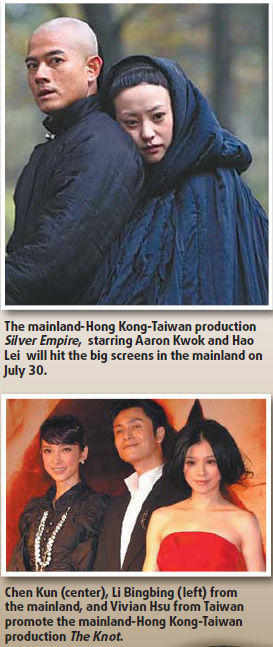Opportunity Knocks
By Liu Wei (China Daily)
2009-07-01 14:01
 |
Large Medium Small |
Hou, Tsai Ming-liang and Edward Yang, were frequent winners of top international film festivals in the early and middle 1990s, but their art house films and those of their followers have lost market share to Hollywood productions since the late 1990s.
While Taiwan has a quota of 10 mainland films released per year, Taiwan productions have to be "specially approved by authorities," says Frank Chen. But, according to Zhang Xun, general manager of China Film Co-Production Corporation, co-productions between the mainland and Taiwan are not bound by the regulation and are screened as local productions. They are not included in the annual quota of 20 foreign films a year that are released here.
Therefore, co-production is a good way around the difficulties of distribution, and Hong Kong is a notable precedent.
Since the 2003 signing of the Closer Economic Partnership Arrangement (CEPA), the Hong Kong film business has benefited from the mainland's big audience, varied locations and rich talent.
Many Hong Kong directors such as Tsui Hark and Peter Chan have set up studios in Beijing and shifted their focus to co-productions.
"In Beijing, we are used to talking about what films a company has shot this year, but will not emphasize whether they are mainland, Hong Kong or Taiwan productions," said mainland director Feng Xiaogang when he was in Taiwan last month, promoting his romantic comedy If You are the One.
There are still problems, however, Chiao says.
"The mainland and Hong Kong co-productions suffer from the monotony of blockbusters featuring the combination of an ancient story from the mainland and lavish production design, action choreography and a stellar cast from Hong Kong," she says.
"Taiwan cinema, which has the tradition of a strong concern for humanity, may inspire something different. The best outcome would be culture from the three sides leading to a creative clash that makes really good Chinese films."
How to cater to the taste of both sides' audiences, after the two sides' decades-long separation, is also a big challenge, Chiao adds.
"For a long time, the two sides had little way of knowing each other's films," says Chiao, who also teaches at Taiwan University of the Arts. "Some of my students still consider mainland films as propaganda and to many mainland viewers their impressions of Taiwan film is just romantic tragedies or art house."
She is now producing a mainland-Hong Kong-Taiwan production called Silver Empire, which will hit the big screens in the mainland on July 30.
"The story is set in the Qing Dynasty (1644-1911), a remote period for today's Taiwan audience, and most actors are from the mainland," she says. "I am a bit worried if the audience in Taiwan will accept the story and the acting style. We need time to know each other better, and the best way forward is through continuous cooperation."
Frank Chen, however, thinks a clear policy is the most important factor. "We know we need the screenplay to be approved by the State Administration of Radio, Film and TV (SARFT) to start a co-production," he says. "We respect the policy, but I think a rating system instead would be fairer to both filmmakers and audience, so that we are clear what we can do and for whom we are making the film."
"The absence of a stable and clear policy will hamper cooperation and creativity," agrees Hou.
The delegation talked with SARFT on Monday, but details have not been revealed, as of press time.
(China Daily 07/01/2009 page18)
